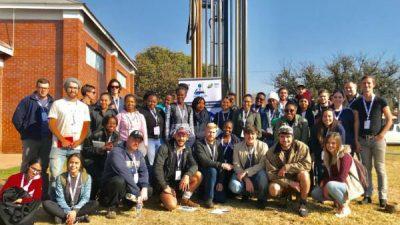National Groundwater Student Field School

South Africa has a number of universities providing professional academic qualifications in groundwater and groundwater related professions. Being a very practical discipline, hydrogeology requires a substantial amount of field and laboratory exposure for graduates. This can be very costly and is hard to achieve without placing the financial burden of field exposure on the students directly.
As such, the GWD and IAH teamed up to host the first ever combined field school for students completing their professional four-year degrees in groundwater-related subjects. The GWD agreed to host industry courses for professionals requiring continuous professional development (CPD) points with the professional registrar. Profits from this event, as well as some presenter honoraria donated back to the GWD, were used to fund the mobilization, accommodation, meals and study materials of 31 students from five universities across South Africa.
The North-West University opted to host this first field school, with the budget acquired through industry courses presented at the University of Pretoria. Students from the North-West University (NWU; Potchefstroom), University of Pretoria (UP; Pretoria), University of KwaZulu-Natal (UKZN; Durban), University of Stellenbosch (US; Cape Town) and University of the Western Cape (UWC; Cape Town) attended the field school 11-15 June in Potchefstroom with the course being presented by Prof Ingrid Dennis, Dr Rainier Dennis and Mr Nicolaus van Zweel from NWU, and Dr Roger Diamond and Dr Matthys Dippenaar from UP.
Students were exposed to field-based geophysical investigations, rotary percussion borehole drilling, borehole logging, hydraulic testing including slug-testing and pumping testing, groundwater sampling, and downhole camera.
Short lectures focused on specialist topics covered in varying detail in different syllabi presented by academics publishing on the topics. These included geophysics, vadose zone hydraulics, and isotope hydrology. Normal hydrogeological background normal was assumed, and the field school did not attempt to replace content fixed in different curricula of different institutions.
As the event was completely free for students, it was all inclusive and accessible to all. The only requirements for participation was involvement of the relevant university in the GWD as the primary funder of the event, the commitment of the university to contribute to this or future such field schools, and, if required, contributing to mobilization costs.
The event was an enormous success and highlights collaboration between tertiary academic institutions to the benefit of the profession without conflict of interest. Students made friends with future colleagues from other specialist disciplines, at other institutions, and from other cities. They learnt about new research from South African academics and broadened their horizons through exposure to state-of-the-art field methods.
Given the success and very positive feedback from this event, we are planning to host another in 2019, with universities in the city of Cape Town being prepared to host.
Feedback from UWC Students
Kamohelo Mokoena
On the behalf of all of the University of Western Cape students who attend the Winter Field School, we would like to thank you for this great opportunity.
As the Winter Field School has created a platform that allowed us to gain first-hand experience in hydrogeology. We were exposed not only the theory but the practical side of this field.
We appreciate the uniqueness of the programme it allowed us to further our knowledge and our skillset. The programme has also contributed to our individual honours research project by increasing our understanding to different components of hydrogeology.
Lastly we were able to network with students and professionals from different fields of hydrogeology, this was very exciting and informative.
Kind Regards, UWC Students